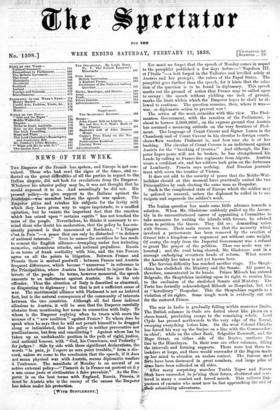NEWS- OF THE Inn . .
THE Emperor of the French has spoken, and Europe is not con- vulsed. Those who had read the signs of the times, and re- flected on the great difficulties of all the parties in regard to the Italian dispute, did not look for revelations from the Emperor. Whatever his ulterior policy may be, it was not thought that he would expound it to us. And accordingly he did not. His present policy—to give support to the Italians against the Austrians—was manifest before the speech was speken. The Emperor pities and rebukes his subjects for the levity with which they have given way to vague inquietude, to a muffled agitation, but he vaunts the important fact that the emotion which has seized upon" oertains esprits " has not touched the mass of the people. Nevertheless, he thinks it necessary to re- mind those who' doubt his moderation, that the policy he has con- stantly pursued is that announced at Bordeaux " L'Empire c'est la Paix "—a peace that can only be disturbed "in defence of national interests." Next he names the sacrifices he has made to cement the English alliance—trampling under foot irritating memories, calumnious attacks, and national prejudices. Russia is on terms of frank cordiality with him, and the two Powers agree on all the points in litigation Between France and Prussia there is mutual goodwill : between France anti Austria frequent differences, which become " numerous " in reference to the Principalities, where Austria has interfered to injure the in- terests of the people. In terms, however measured, the speech amounts to an indictment against Austria. She is the sole offender. Thus the situation of Italy is described as abnormal, as disquieting to diplomacy ; but that is not a sufficient cause of war. The matrimonial affiance with Piedmont is not an isolated fact, but is the natural consequence of the community of interests between the two countries. Although all feel these indirect allusions to Austria, it will be seen that the Emperor carefully abstains from mentioning her name in connection with Italy. To whom is the Emperor replying when he treats with scorn the menace of a "new coalition" against France ? To whom does he speak when he says that he will not permit himself to be dragged along or intimidated, that his policy is neither provocative nor pusillanimous, but firm and conciliating? Against whom has he taken up an unshakeable position in the path of right, justice, and national honour, with "God, his Conscience, and Posterity" for judges ? Side by side with these significant declarations, the words "la paix, je l'espere ne sera point troublee," form a dis- cord, unless we come to the conclusion that the speech, if it does not mean physical war with Austria, means diplomatic warfare
l'outrance. The manifesto of Monday is an avowal of an active external policy—" l'interet de la France est partont on ii y a une cause juste et eivilisatrice a faire prevaloir." ' As the Em- peror is on the bast terms with England, Russia, Prussia, it must be Austria who is the enemy of the causes the Emperor has taken under his protection. Nor must we forget that the speech of Monday comes in sequel to the pamphlet published a few days before—" Napoleon III. et l'Italie "—a bolt forged in the Tuileries and levelled solely at Austria and her proteges, the rulers of the Papal States. The pamphlet goes further than the speech, for it hints that the solu- tion of the question is to be found in diplomacy. This speech marks out the ground of action that France may be called upon to occupy ; the speech without yielding one inch of ground, marks the limit within which the Emperor hopes he shall be al- lowed to continue. The question remains, then, where it was— war, or diplomatic action to prevent war?
The action af the week coincides with this view. The Pied- montese Government, with the sanction of the Parliament, is about to borrow 2,000,0001., on the express ground that Austria has assumed a menacing attitude on the very frontiers of Pied- mont. The language of Count Cavour and Signor Lanza in the Chamber and of Count Cavour in his circular to foreign courts, shows tow resolute Piedmont is, and how sure she is of her backing. The circular of Count Cavour is an indictment against Austria for the "breaking of treaties." And although, the Em- peror hopes peace will not be broken, he has strengthened his hands by calling to France five regiments from Algeria. Austria wears a confident air, and her soldiers look grim on the fortresses of Lombardy. Prussia says nothing. And Russian journals treat with scorn the treaties of Vienna.
It does not add, to the security of peace that the Moldo-Wal- lachtans should at this moment have practically united the two Principalities by each electing the same man as Hospodar.
Such is the complicated state of Europe which the soldier may be ordered to ;unravel, unless the diplomat be called in to an- ticipate and supersede the soldier's work.


































